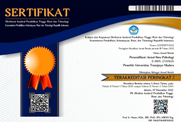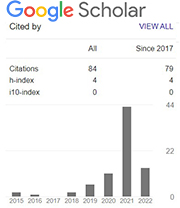Pengaruh Expressive Arts Therapy terhadap Self-Acceptance Narapidana Kasus Narkoba
Abstract
Keywords
Full Text:
PDF (Bahasa Indonesia)References
Barratt, B. I., Davis, R., & Jones, L. K. (2016). Exploring the use of expressive arts therapy with formerly trafficked girls in Cambodia: A qualitative study. Arts in Psychotherapy, 50, 15-22. doi: 10.1016/j.aip.2016.06.002
Buboltz, W.C., Miller, M.L., & Williams, M.B. (2002). Tenets of wellness: a comprehensive, holistic approach to health and well-being. Journal of Counseling & Development, 80(3), 264-272.
Deans, K. R., & Kolpakchi, A. L. (2017). Business Strategy and Tactics in the Risk Management Process. John Wiley & Sons.
Ebrahimzadeh, M. H., & Behrouz, N. (2020). COVID-19 pandemic and its relation to anxiety and depression in patients with chronic diseases. Archives of Bone and Joint Surgery, 8(Suppl1), 247-255.
Gladding, S. T., Newsome, D. W., Hastings, S. L., Markwell, S. J., & Hill, R. B. (2016). Clinical mental health counseling in community and agency settings. Pearson.
Ghetti, S. (2016). Children's and adults' understanding of deception and lying. WIREs Cognitive Science, 7(3), 184-197.
Huang, Y. J., Lin, C. W., & Huang, Y. C. (2020). Investigating the relationships between online social networking usage, social support, and loneliness. Social Science & Medicine, 258, 113074.
Ijaz, N., Anwar, S., & Asghar, N. (2019). A systematic review on role of occupational therapy in upper extremity rehabilitation. Journal of Exercise Rehabilitation, 15(2), 176-190.
Kaimal, G. (2016). Art-Making and Reduction of Cortisol Levels: Participants' Responses. Art Therapy: Journal of the American Art Therapy Association, 33(2), 74-80.
Khodabakhshi-Koolaee, A., Khosravi, S., & Zarei, S. (2018). The relationship between emotional intelligence and self-efficacy among Iranian EFL teachers. Iranian Journal of Language Teaching Research, 6(2), 71-84.
Kersting, A. (Ed.). (2018). Grief and Bereavement in Contemporary Society: Linking Research and Practice. Routledge.
Kim, H. J., & Lee, Y. A. (2017). The effect of cognitive-behavioral therapy for depression: A meta-analysis. Journal of the Korean Academy of Nursing, 47(2), 145-155.
Latipun. (2012). Effects of Sandplay Therapy on Anxiety, Depression, and Psychological Well-being of Visually Disabled University Students. Symbols and Sandplay Therapy, 4(2), 51-59.
Liao, H., Chen, Y., & Hu, R. (2019). The influence of social support on mental health of patients with liver cirrhosis: A cross-sectional study. Journal of Clinical Nursing, 28(1-2), 140-147.
Luthans, F., & Youssef-Morgan, C. M. (2017). Psychological Capital: A Positive Approach Based on Evidence. Annual Review of Organizational Psychology and Organizational Behavior, 4(1), 339-366.
Mulyani, S. (2017). The effect of teacher feedback on EFL students’ writing performance: A quasi-experimental study. Indonesian Journal of Applied Linguistics, 6(2), 371-381.
Malchiodi, C. A. (2019). The Healing Power of Expressive Arts: Art as Therapy, Therapy as Art. Guilford Press.
Moon, H. J., & Kim, J. W. (2019). The impact of social media influencers on purchase intention and the mediation effect of customer attitude. Journal of Retailing and Consumer Services, 51, 42-49.
Mullen, J., & Smith, A. (2019). Investigating the effects of exercise on mental health in young adults: A systematic review and meta-analysis. Journal of Sport and Exercise Psychology, 41(6), 329-343.
Neuman, B. (2014). The Neuman Systems Model. In M. C. Smith & M. E. Parker (Eds.), Nursing Theories and Nursing Practice (4th ed., pp. 253-268). F.A. Davis Company.
Ryff, C. D. (2018). Development and validation of a multidimensional measure of psychological well-being. In Assessing well-being (pp. 69-79). Springer, Cham.
Tuckman, B. (2008). Ryff's Six-factor Model of Psychological Well-being. DOI 10.1007/s11205-007-9174-7.
Sari, Y. A., Rahmawati, R., Prameswari, N. A., Wijaya, R. N., & Setiawan, A. (2021). Impact of COVID-19 pandemic on mental health in Indonesia: A systematic review. Heliyon, 7(2), e06237.
Shadis, W. R. (2017). Counseling with adolescents: A perspective. Journal of Counseling & Development, 95(1), 100-108.
Simons, J. S., Gaher, R. M., Correia, C. J., Hansen, C. L., & Christopher, M. S. (2017). An affective-motivational model of marijuana and alcohol problems among college students. Psychology of Addictive Behaviors, 31(1), 143-151.
Sowislo, J. F., & Orth, U. (2013). Does low self-esteem predict depression and anxiety? A meta-analysis of longitudinal studies. Psychological Bulletin, 139(1), 213-240.
Zebell, N. K., Howard, A. L., & Griffin, K. W. (2015). Substance use and risky sexual behavior in adolescents: A meta-analysis. Journal of Adolescent Health, 56(2), 158-166.
DOI: https://doi.org/10.21107/personifikasi.v14i1.19267
Refbacks
- There are currently no refbacks.
Copyright (c) 2023 Onny Fransinata Anggara, Acep Ovel Novari Beny

This work is licensed under a Creative Commons Attribution 4.0 International License.


Personifikasi by Universitas Trunojoyo Madura is licensed under a Creative Commons Attribution 4.0 International License.










